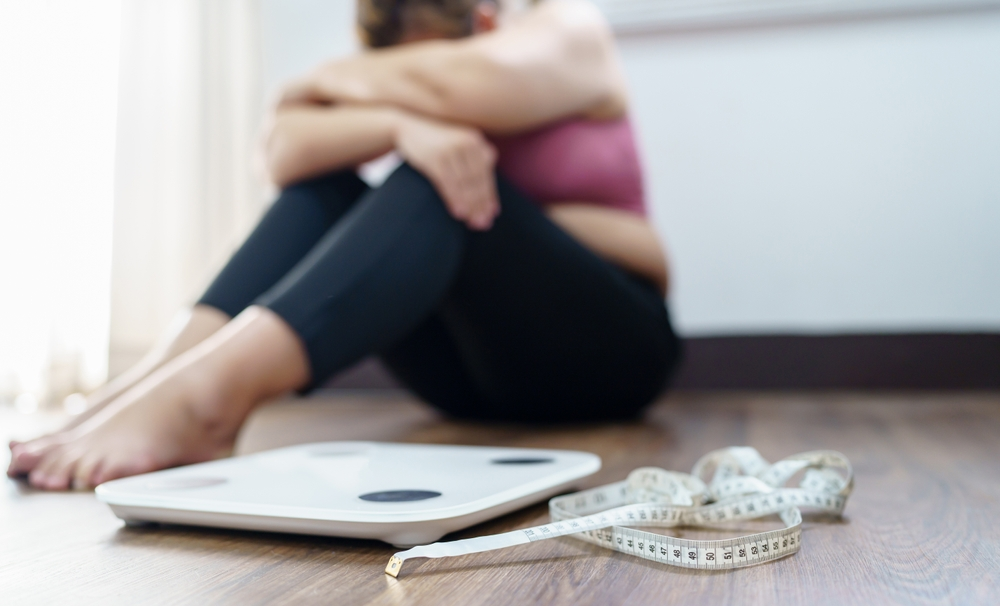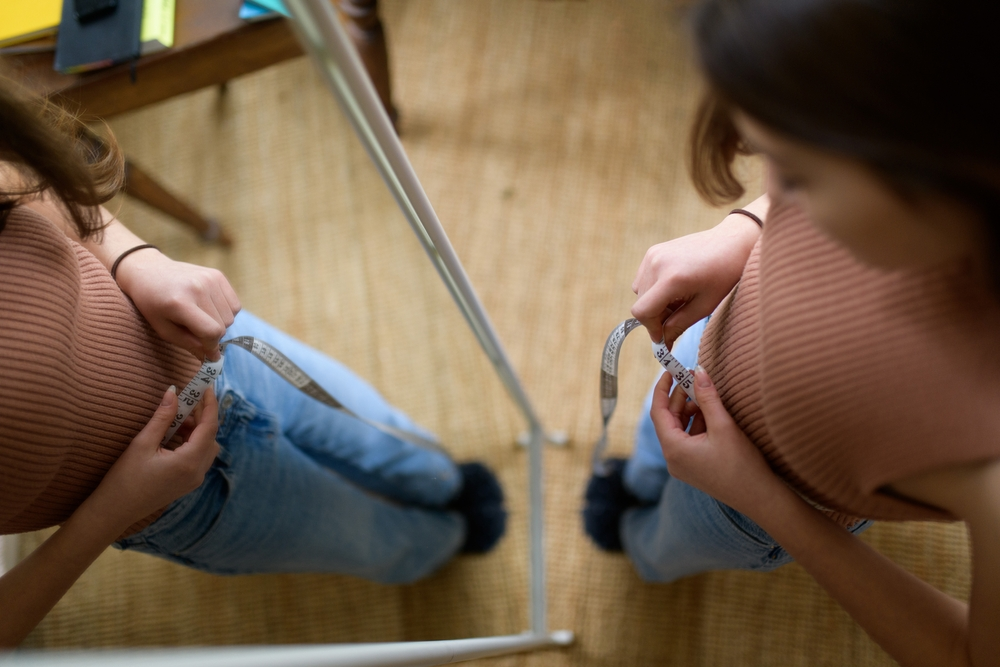Anorexia nervosa is more than just a desire to be thin. It’s a complex and often life-threatening eating disorder rooted in a deep fear of weight gain and a distorted view of one’s body. While it’s most commonly diagnosed in adolescent girls, anorexia can affect anyone—regardless of age, gender, or background.
At Charlotte Recovery Centers, we know how isolating and overwhelming this illness can feel. But you don’t have to go through it alone. With compassionate care and evidence-based treatment, recovery is not only possible—it’s within reach.
What Is Anorexia Nervosa?
Anorexia nervosa is a mental health condition that involves extreme restriction of food, an intense fear of gaining weight, and a skewed perception of body shape and size. It often becomes a way for individuals to cope with anxiety, trauma, or a need for control. Over time, these patterns can cause serious health problems, including organ failure, heart complications, and in some cases, death.
There are two main types of anorexia:
- Restricting Type: Characterized by extreme limitation of food intake and often excessive exercise.
- Binge-eating/Purging Type: Involves restriction as well as episodes of binge eating followed by purging behaviors like vomiting or using laxatives.
A third and lesser-known form, atypical anorexia, involves all the same behaviors and psychological struggles, but the person’s weight remains within or above the normal range. This makes it harder to detect, but it’s just as serious.
Why Early Intervention Matters
According to the National Institute of Mental Health, anorexia nervosa affects approximately 0.9% of women and 0.3% of men during their lifetime. It also has the highest mortality rate of any psychiatric disorder.
The earlier someone receives treatment, the better their chance of full recovery. Unfortunately, many people with anorexia delay seeking help, either because they don’t believe their situation is “serious enough” or because they’re afraid of judgment.
The risk of suicide in anorexia patients is 18 times higher than those who don’t have an eating disorder.
Common Warning Signs and Symptoms
Recognizing the signs of anorexia isn’t always easy, especially in the early stages. But there are several red flags to look out for—both physical and emotional.
Physical symptoms might include:
- Noticeable weight loss or failure to gain weight during growth periods
- Fatigue or low energy
- Dizziness or fainting
- Hair thinning or loss
- Missed periods or irregular menstruation
- Cold hands and feet
- Gastrointestinal complaints like bloating or constipation
Emotional and behavioral symptoms may include:
- Obsessive calorie counting or food rituals
- Intense fear of gaining weight, even if underweight
- Excessive exercise routines
- Refusing to eat in public or skipping meals entirely
- Irritability, depression, or social withdrawal
- Constant negative comments about body size or shape
These signs don’t always show up all at once, and someone doesn’t need to be visibly underweight to be struggling with anorexia. If food and weight are taking over someone’s thoughts, it’s time to reach out.
How to Treat Anorexia Nervosa
At Charlotte Recovery Centers, we approach anorexia nervosa treatment with care, expertise, and compassion. Our programs are personalized to meet each client where they are in their recovery journey.
Medical Stabilization
For those experiencing severe weight loss or physical complications, medical stabilization may be the first step. This includes addressing electrolyte imbalances, low blood pressure, heart irregularities, and other potentially life-threatening symptoms.
Hospitalization or close medical supervision may be necessary to ensure safety before beginning therapeutic treatment.
Nutritional Counseling
Once stable, the next step is restoring a healthy relationship with food. Our registered dietitians work closely with each client to develop individualized meal plans that support nutritional rehabilitation.
Rather than focusing solely on calories, we help clients understand the importance of nourishment, challenge food fears, and rebuild trust with their bodies—one meal at a time.
Individual Therapy
Therapy is a cornerstone of recovery. We offer evidence-based approaches like Cognitive Behavioral Therapy (CBT), which helps clients identify and challenge harmful thought patterns about body image, control, and self-worth.
CBT can be incredibly effective in reducing relapse and supporting long-term healing.
Family-Based Treatment (FBT)
For adolescents and teens, we often recommend Family-Based Treatment (also known as the Maudsley Method). In this approach, parents play an active role in supporting their child’s recovery, particularly around meals and emotional regulation.
FBT empowers families and helps create a recovery-focused home environment.
Group Therapy and Peer Support
Eating disorders thrive in secrecy. That’s why group therapy is such a powerful tool. Sharing experiences with others who truly understand can reduce shame, promote connection, and build resilience.
We also offer ongoing peer support groups to help clients stay grounded and motivated throughout the recovery process.
Holistic Care
We understand that anorexia doesn’t exist in a vacuum. Many of our clients struggle with anxiety, depression, or past trauma. That’s why we provide holistic care that addresses the whole person—mind, body, and spirit.
Our holistic offerings may include:
- Yoga or gentle movement sessions
- Mindfulness and meditation
- Art or music therapy
- Trauma-informed care
When Should You Seek Help?
You don’t need to wait until things get “bad enough” to ask for help. If you—or someone you love—spends a significant amount of time thinking about food, calories, body weight, or appearance, it’s worth having a conversation with a healthcare provider or eating disorder specialist. Anorexia doesn’t always look like the stereotype, and you don’t have to be underweight to be suffering.
Mental and emotional symptoms often show up long before physical ones. And early intervention can prevent lasting damage.
Frequently Asked Questions About Anorexia Nervosa
What causes anorexia nervosa?
Anorexia is caused by a mix of genetic, biological, psychological, and environmental factors. It’s not a choice or a phase—it’s a serious mental health condition.
Can anorexia nervosa be cured?
Yes, recovery is possible. With the right support and treatment, many people fully recover and go on to live healthy, fulfilling lives.
Is weight gain always part of recovery?
In many cases, yes. Restoring weight can be necessary to address medical complications and support brain health, especially when the body has been undernourished for a long time.
What’s the difference between anorexia and atypical anorexia?
Atypical anorexia involves all the same behaviors and risks, but the person’s weight is within or above the normal range. It’s just as serious and requires treatment.
How do you approach treatment for teens vs. adults?
Teens often benefit from Family-Based Treatment (FBT), where parents are actively involved. Adults may work more independently in therapy, though family support can still play a big role.
Are there medications for anorexia?
There are no medications specifically approved for treating anorexia, but some may be prescribed to help manage anxiety, depression, or obsessive thoughts.
How long does recovery take?
Recovery isn’t a straight line. Some people make progress quickly, while others need more time. What matters most is consistency, support, and a treatment team that truly understands.
What if someone doesn’t think they’re “sick enough” for help?
This is incredibly common. Many people with anorexia minimize their symptoms or believe others have it worse. But if your thoughts about food or body image are getting in the way of life, you deserve help.
How can I support a friend or loved one with anorexia?
Start with compassion. Listen without judgment, express concern, and encourage them to speak with a professional. Avoid making comments about weight or food.
What happens if anorexia is left untreated?
Untreated anorexia can lead to severe complications including organ damage, infertility, heart failure, and death. Early intervention saves lives.
Take the First Step with Charlotte Recovery Centers
If you’re reading this and wondering whether it’s time to get help, it probably is. Anorexia nervosa is a serious illness, but healing is absolutely possible—and you don’t have to do it alone.
At Charlotte Recovery Centers, we’re here to walk beside you with empathy, clinical expertise, and a deep belief in your capacity to recover. Whether you’re reaching out for yourself or someone you love, we’re ready when you are.
Let today be the day you take that first step. Contact us to learn more about our personalized treatment programs and how we can support your journey to recovery.






